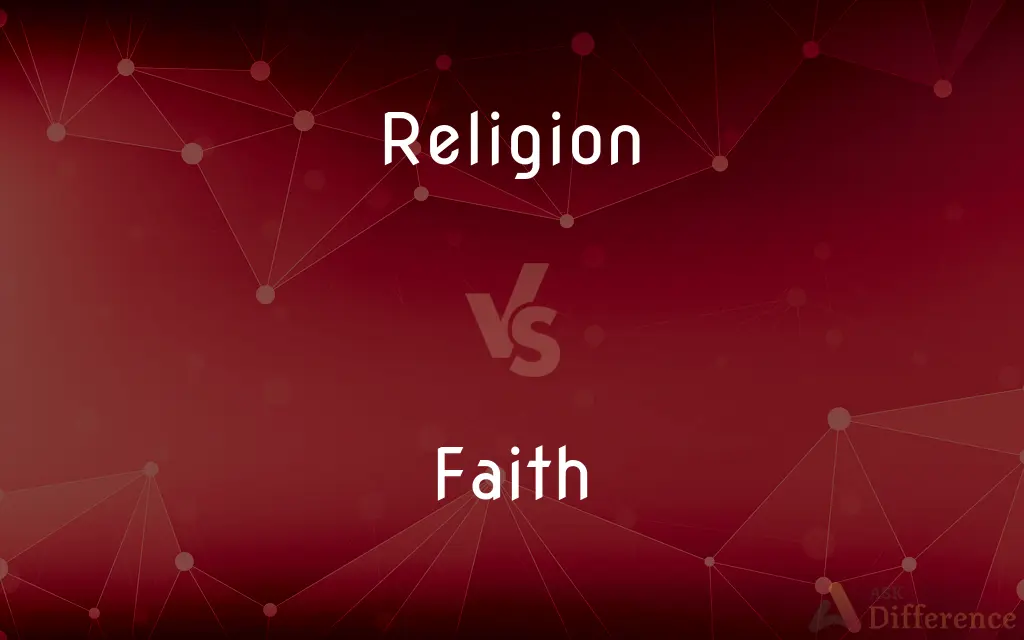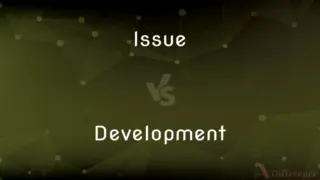Religion vs. Faith — What's the Difference?
By Maham Liaqat & Fiza Rafique — Updated on March 26, 2024
Religion involves organized beliefs, practices, and institutions centered around the worship of a higher power, while faith is a personal conviction or trust in a belief or doctrine, often spiritual in nature.

Difference Between Religion and Faith
Table of Contents
ADVERTISEMENT
Key Differences
Religion is an organized system that encompasses beliefs, practices, rituals, and moral codes, designed to foster a community's worship of one or more deities or sacred principles. It often includes structured institutions and follows specific doctrines. On the other hand, faith is more individualistic, representing a person's inner trust and belief in a higher power, principles, or doctrines, without necessarily adhering to the organized practices or rituals of a religion.
While religion typically requires adherence to established rituals, ceremonies, and rules defined by a religious authority or scripture, faith is inherently personal and can exist without formal rituals or official recognition. Faith is about an individual's conviction and can be the foundation for someone’s religious practice, but it can also exist independently of any religious framework.
Religions often provide a community and sense of belonging to their followers, offering guidance through shared beliefs and practices. Conversely, faith, while it can be shared with others, is ultimately a personal journey that may or may not align with a specific religious community.
Furthermore, religion, with its structured institutions, plays a significant role in cultural and societal norms, influencing laws, traditions, and social behavior. Faith, however, influences individuals' decisions and perspectives, guiding them through personal moral and ethical dilemmas.
The exploration of faith can lead to the questioning of one's own beliefs and practices, fostering a personal spiritual journey. Religion, while it can accommodate personal growth and questioning, often provides predefined answers and paths within its teachings.
ADVERTISEMENT
Comparison Chart
Definition
An organized system of beliefs, ceremonies, and rules used to worship a god or a group of gods.
Strong belief or trust in something or someone, often without empirical evidence.
Basis
Institutionalized, structured practices and doctrines.
Personal conviction and trust.
Practices
Formal rituals, ceremonies, and adherence to scripture.
Can be expressed individually without formal rituals.
Community Aspect
Provides a sense of belonging and community through shared beliefs.
Primarily personal, though it can be shared within or outside of religious contexts.
Influence on Behavior
Shapes behavior through formal moral codes and societal norms.
Influences individual decisions and perspectives.
Compare with Definitions
Religion
An organized framework that connects individuals through common traditions and rituals.
The church plays a central role in many people's religious lives.
Faith
Complete trust or confidence in a person, thing, deity, or doctrine.
His faith in humanity was restored after witnessing the acts of kindness.
Religion
The practice of conducting rituals, celebrations, and services.
Religion often involves the observance of holy days and ceremonial events.
Faith
A personal or shared conviction towards spiritual truths.
They shared a faith that transcended their religious differences.
Religion
A structured belief system concerning the supernatural, sacred, or divine, and the moral codes, practices, values, institutions, and rituals associated with such belief.
Hinduism is one of the oldest religions in the world.
Faith
A spiritual belief not based on proof.
Faith often requires belief in the unseen and unprovable.
Religion
A system that dictates moral and ethical codes.
Her actions were guided by her deep religious convictions.
Faith
The act of believing in religious doctrines or a divine being without doubt.
Her faith was strong, even in times of trouble.
Religion
A community formed around shared beliefs and practices.
The local religious community came together to support the family.
Faith
Inner strength or trust derived from spiritual beliefs.
His faith gave him the strength to overcome the obstacles.
Religion
Religion is a social-cultural system of designated behaviors and practices, morals, beliefs, worldviews, texts, sanctified places, prophecies, ethics, or organizations, that relates humanity to supernatural, transcendental, and spiritual elements; however, there is no scholarly consensus over what precisely constitutes a religion.Different religions may or may not contain various elements ranging from the divine, sacred things, faith, a supernatural being or supernatural beings or "some sort of ultimacy and transcendence that will provide norms and power for the rest of life". Religious practices may include rituals, sermons, commemoration or veneration (of deities and/or saints), sacrifices, festivals, feasts, trances, initiations, funerary services, matrimonial services, meditation, prayer, music, art, dance, public service, or other aspects of human culture.
Faith
Faith, derived from Latin fides and Old French feid, is confidence or trust in a person, thing, or concept. In the context of religion, one can define faith as "belief in a god or in the doctrines or teachings of religion".
Religion
The belief in and reverence for a supernatural power or powers, regarded as creating and governing the universe
Respect for religion.
Faith
Belief in God or in a set of religious doctrines.
Religion
A particular variety of such belief, especially when organized into a system of doctrine and practice
The world's many religions.
Faith
A set of religious doctrines; a body of dogma
Adhered to the Muslim faith.
Religion
A set of beliefs, values, and practices based on the teachings of a spiritual leader.
Faith
Often Faith(Christianity)Secure belief in God and a trusting acceptance of God's will viewed as a theological virtue.
Religion
The life or condition of a person in a religious order
A widow who went into religion and became a nun.
Faith
Confident or unquestioning belief in the truth, value, or trustworthiness of a person, idea, or thing.
Religion
A cause, principle, or activity pursued with zeal or conscientious devotion
A person for whom art became a religion.
Faith
Loyalty to a person or thing; allegiance
Keeping faith with one's supporters.
Refused to break faith with his friends.
Religion
(uncountable) Belief in a spiritual or metaphysical reality (often including at least one deity), accompanied by practices or rituals pertaining to the belief.
My brother tends to value religion, but my sister not as much.
Faith
A trust or confidence in the intentions or abilities of a person, object, or ideal from prior empirical evidence.
The faithfulness of Old Faithful gives us faith in it.
I have faith in the goodness of my fellow man.
You need to have faith in yourself, that you can overcome your shortcomings and become a good person.
Religion
(countable) A particular system of such belief, and the rituals and practices proper to it.
Belief system
Islam is a major religion, particularly in North Africa and Southwest Asia.
Mormonism is a new religion, while Zoroastrianism is an old one.
Faith
A conviction about abstractions, ideas, or beliefs, without empirical evidence, experience, or observation.
I have faith that my prayers will be answered.
I have faith in the healing power of crystals.
Religion
(uncountable) The way of life committed to by monks and nuns.
The monk entered religion when he was 20 years of age.
Faith
A religious or spiritual belief system.
The Christian faith.
We seek justice for the Indo-European Folk Faith; what's wrong in our literature for that?
Religion
Rituals and actions associated with religious beliefs, but considered apart from them.
I think some Christians would love Jesus more if they weren't so stuck in religion.
Jack's spiritual, but he's not really into religion.
Faith
An obligation of loyalty or fidelity and the observance of such an obligation.
He acted in good faith to restore broken diplomatic ties after defeating the incumbent.
Religion
(countable) Any practice to which someone or some group is seriously devoted.
At this point, Star Trek has really become a religion.
Faith
(obsolete) Credibility or truth.
Religion
Faithfulness to a given principle; conscientiousness.
Faith
(archaic) really, truly
Religion
Engage in religious practice.
Faith
Belief; the assent of the mind to the truth of what is declared by another, resting solely and implicitly on his authority and veracity; reliance on testimony.
Religion
Indoctrinate into a specific religion.
Faith
The assent of the mind to the statement or proposition of another, on the ground of the manifest truth of what he utters; firm and earnest belief, on probable evidence of any kind, especially in regard to important moral truth.
Faith, that is, fidelity, - the fealty of the finite will and understanding to the reason.
Religion
To make sacred or symbolic; sanctify.
Faith
The belief in the historic truthfulness of the Scripture narrative, and the supernatural origin of its teachings, sometimes called historical and speculative faith.
Without faith it is impossible to please him [God].
The faith of the gospel is that emotion of the mind which is called "trust" or "confidence" exercised toward the moral character of God, and particularly of the Savior.
Faith is an affectionate, practical confidence in the testimony of God.
Religion
The outward act or form by which men indicate their recognition of the existence of a god or of gods having power over their destiny, to whom obedience, service, and honor are due; the feeling or expression of human love, fear, or awe of some superhuman and overruling power, whether by profession of belief, by observance of rites and ceremonies, or by the conduct of life; a system of faith and worship; a manifestation of piety; as, ethical religions; monotheistic religions; natural religion; revealed religion; the religion of the Jews; the religion of idol worshipers.
An orderly life so far as others are able to observe us is now and then produced by prudential motives or by dint of habit; but without seriousness there can be no religious principle at the bottom, no course of conduct from religious motives; in a word, there can be no religion.
Religion [was] not, as too often now, used as equivalent for godliness; but . . . it expressed the outer form and embodiment which the inward spirit of a true or a false devotion assumed.
Religions, by which are meant the modes of divine worship proper to different tribes, nations, or communities, and based on the belief held in common by the members of them severally. . . . There is no living religion without something like a doctrine. On the other hand, a doctrine, however elaborate, does not constitute a religion.
Religion . . . means the conscious relation between man and God, and the expression of that relation in human conduct.
After the most straitest sect of our religion I lived a Pharisee.
The image of a brute, adornedWith gay religions full of pomp and gold.
Faith
That which is believed on any subject, whether in science, politics, or religion; especially (Theol.), a system of religious belief of any kind; as, the Jewish or Mohammedan faith; the Christian faith; also, the creed or belief of a Christian society or church.
Which to believe of her,Must be a faith that reason without miracleCould never plant in me.
Now preacheth the faith which once he destroyed.
Religion
Specifically, conformity in faith and life to the precepts inculcated in the Bible, respecting the conduct of life and duty toward God and man; the Christian faith and practice.
Let us with caution indulge the supposition that morality can be maintained without religion.
Religion will attend you . . . as a pleasant and useful companion in every proper place, and every temperate occupation of life.
Faith
Fidelity to one's promises, or allegiance to duty, or to a person honored and beloved; loyalty.
Children in whom is no faith.
Whose failing, while her faith to me remains,I should conceal.
Religion
A monastic or religious order subject to a regulated mode of life; the religious state; as, to enter religion.
A good man was there of religion.
Faith
Word or honor pledged; promise given; fidelity; as, he violated his faith.
For you aloneI broke me faith with injured Palamon.
Religion
Strictness of fidelity in conforming to any practice, as if it were an enjoined rule of conduct.
Those parts of pleading which in ancient times might perhaps be material, but at this time are become only mere styles and forms, are still continued with much religion.
Faith
Credibility or truth.
The faith of the foregoing narrative.
Religion
A strong belief in a supernatural power or powers that control human destiny;
He lost his faith but not his morality
Faith
By my faith; in truth; verily.
Religion
Institution to express belief in a divine power;
He was raised in the Baptist religion
A member of his own faith contradicted him
Faith
A strong belief in a supernatural power or powers that control human destiny;
He lost his faith but not his morality
Faith
Complete confidence in a person or plan etc;
He cherished the faith of a good woman
The doctor-patient relationship is based on trust
Faith
Institution to express belief in a divine power;
He was raised in the Baptist religion
A member of his own faith contradicted him
Faith
Loyalty or allegiance to a cause or a person;
Keep the faith
They broke faith with their investors
Common Curiosities
How do religion and faith differ in practice?
Religion involves formal rituals and adherence to specific doctrines, while faith is an individual's belief that can exist without structured practices.
What is faith?
Faith is a personal belief or trust in a doctrine, principle, or deity, often without empirical evidence.
Can you have faith without religion?
Yes, individuals can have faith or belief systems that are not tied to any organized religion.
Is faith always religious?
Not necessarily; faith can also refer to trust or confidence in concepts, people, or things beyond the religious sphere.
What is religion?
Religion is an organized system of beliefs and practices centered around spiritual beliefs, often involving worship of a higher power or deity.
Can religion exist without faith?
Technically, yes. One can participate in religious practices out of tradition or cultural identity without having personal faith in its doctrines.
What role does faith play in individual lives?
Faith can guide individuals in making decisions, provide comfort during difficult times, and influence their outlook on life and morality.
Are there multiple religions within a single faith tradition?
Yes, many faith traditions encompass a variety of religions with differing beliefs, practices, and interpretations of spiritual truths.
How does religion impact society?
Religion can significantly influence societal norms, morals, laws, and culture through its organized practices and teachings.
How do religion and faith influence each other?
Faith can be the foundation of religious practice, while religion can provide a community and structure for expressing faith.
How can faith impact mental health?
Faith can provide a sense of purpose, comfort, and support, potentially having a positive impact on mental health.
How do personal and communal aspects of religion and faith differ?
Religion often emphasizes community and shared practices, while faith is more about personal convictions and beliefs.
Can faith change over time?
Absolutely. Individuals' faith can evolve based on personal experiences, reflections, and changes in belief.
What is the significance of rituals in religion?
Rituals in religion serve to express beliefs, create a sense of community, and connect individuals to their faith in a structured way.
What challenges can arise when balancing personal faith with organized religion?
Conflicts may arise when personal beliefs or experiences do not align with the teachings or practices of an organized religion, leading to spiritual or communal tensions.
Share Your Discovery

Previous Comparison
Issue vs. Development
Next Comparison
Spaghettoni vs. SpaghettiniAuthor Spotlight
Written by
Maham LiaqatCo-written by
Fiza RafiqueFiza Rafique is a skilled content writer at AskDifference.com, where she meticulously refines and enhances written pieces. Drawing from her vast editorial expertise, Fiza ensures clarity, accuracy, and precision in every article. Passionate about language, she continually seeks to elevate the quality of content for readers worldwide.















































